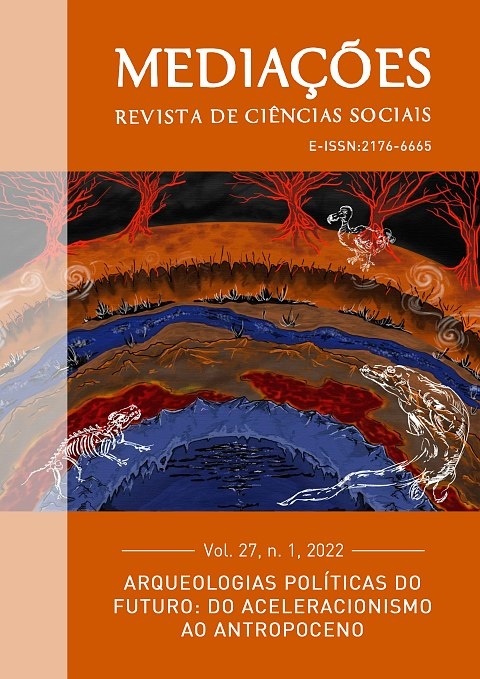Influencia religiosa en la tolerancia política hacia los homosexuales: análisis comparativo en América Latina
DOI:
https://doi.org/10.5433/2176-6665.2022v27n1e44055Palabras clave:
influencia religiosa, intolerancia política, homosexualidad.Resumen
O objetivo deste artigo é discutir a influência da religião sobre a tolerância política em relação aos homossexuais e, igualmente, identificar quais aspectos religiosos são mais proeminentes no ato de tolerar, através dos três B's belonging, believing e behaving. O material empírico é oriundo do Latin American Public Opinion Project (LAPOP), mais especificamente das rodadas de questionários de 2014 a 2019, aplicadas no Brasil, Uruguai, El Salvador e Guatemala. Parte-se da hipótese (H1) de que os países com os menores índices de tolerância possuem indivíduos ativos religiosamente, que atribuem maior importância à religião e são filiados a denominações religiosas mais conservadoras. Através de regressões lineares, , bem como análises comparativas, constatou-se que a H1 foi parcialmente confirmada, pois em apenas uma rodada constatou-se significativas diferenças entre os países. Portanto, de maneira geral a denominação religiosa protestante influencia igualmente os quatro países ocasionando diminuição da tolerância.Descargas
Citas
BRASIL. Projeto de Lei do Senado n° 612, de 2011. Altera os arts. 1.723 e 1.726 do Código Civil, para permitir o reconhecimento legal da união estável entre pessoas do mesmo sexo. Brasília: Senado Federal, 2011. Disponível em: https://www25.senado.leg.br/web/atividade/materias/-/materia/102589. Acesso em: 6 abr. 2020.
BRASIL. Supremo Tribunal Federal. STF enquadra homofobia e transfobia como crimes de racismo ao reconhecer omissão legislativa. Brasília: STF, 2019. Disponível em: https://portal.stf.jus.br/noticias/verNoticiaDetalhe.asp?idConteudo=414010. Acesso em: 6 abr. 2020.
BRASIL. Supremo Tribunal Federal. Supremo reconhece união homoafetiva. Brasília: STF, 2011. Disponível em: http://www.stf.jus.br/portal/cms/verNoticiaDetalhe.asp?idConteudo=178931. Acesso em: 6 abr. 2020
BURDETTE, Amy M.; ELLISON, Christopher G.; HILL, Terrence D. Conservative protestantism and tolerance toward homosexuals: an examination of potential mechanisms. Sociological Inquiry, Austin, v. 75, n. 2, p. 177-196, maio 2005.
DJUPE, Paul A. (ed.). Religion and political tolerance in America: advances in the state of the art. Philadelphia: Temple University Press, 2015.
EISENSTEIN, Marie A. Rethinking the relationship between religion and political tolerance in the US. Political Behavior, [s.l.], v. 28, n. 4, p. 327-348, 15 nov. 2006.
GIBSON, James L.; TEDIN, Kent L. The etiology of intolerance. In: MIDWEST POLITICAL SCIENCE ASSOCIATION, 1986. Paper […]. [S.l.]: Midwest Political Science Association, 1986.
JELEN, Ted G.; WILCOX, Clyde. Denominational preference and the dimensions of political tolerance. Sociological Analysis, Worcester, v. 51, n. 1, p. 69, 1990.
LEEGE, David C.; WALD, Kenneth D.; KELLSTEDT, Lyman A. Religion and politics: a report on measures of religiosity in the 1989 NES Pilot Study. Phoenix: National Election Studies Board, 1996.
MACHADO, Maria das Dores Campos. Aborto e ativismo religioso nas eleições de 2010. Revista Brasileira de Ciência Política, Brasília, n. 7, p. 25–54, abr. 2012.
NUNN, Clyde Z.; CROCKETT, Harry J.; WILLIAMS JUNIOR, Allen. Tolerance and non conformity. San Francisco: Jossey-Bass, 1978.
PROTHRO, James W.; GRIGG, Charles M. Fundamental principles of democracy: bases of agreement and disagreement. The Journal of Politics, Chicago, v. 22, n. 2, p. 276-294,1960.
RIGGLE, Ellen D.; ELLIS, Alan L. Political Tolerance of Homosexuals: the role of group attitudes and legal principles. Journal of Homosexuality, New York, v. 26, n. 4, p. 135–147, mar. 1994.
SCHWADEL, Philip; GARNEAU, Christopher R. H. Sectarian religion and political tolerance in the United States. Sociology of Religion, Washington, v. 80, n. 2, p. 168–193, mai. 2019.
SELIGSON, Mitchell; MORALES, Daniel E. Moreno; RUSSO, Guilherme A. Education, the wealth of nations, and political tolerance toward homosexuals: a multilevel analysis of 26 countries in the Americas. Opinião Pública, Campinas, v. 25, n. 2, p. 234-257, ago. 2019.
SOTELO, Maria José. Political tolerance among adolescents towards homosexuals in Spain. Journal of Homosexuality, New York, v. 39, n. 1, p. 95–105, abr. 2000.
STEENSLAND, Brian et al. The measure of American religion: toward improving the state of the art. Social Forces, Chapel Hill, v. 79, n. 1, p. 291-318, 2000.
STOUFFER, Samuel A. Communism, conformity and liberties: a cross- section of the nation speaks its mind. Nova York: Doubleday, 1955.
SULLIVAN, John L.; PIERESON, James; MARCUS, George E. An alternative conceptualization of political tolerance: illusory increases 1950s–1970s. American Political Science Review, New York, v. 73, n. 3, p. 781–794, set. 1979.
SULLIVAN, John L.; PIERESON, James; MARCUS, George E. Political tolerance and American democracy. London: University of Chicago Press, 1982.
URUGUAY. Constitucion de la Republica Uruguay (1934). Peblicitada el 19 de abril de 1934. Disponível em: https://parlamento.gub.uy/documentosyleyes/constitucion. Último acesso em: 05 de abril de 2022.
WALD, Kenneth; HILL JUNIOR, Samuel; OWEN, Dennis. Political cohesion in churches. Journal of Politics, Austin, n. 52, p. 197-215,1990.
Descargas
Publicado
Cómo citar
Número
Sección
Licencia
Los derechos de autor de los artículos publicados en Mediations son del autor; En caso de republicación parcial o total de la primera publicación, se solicita a los autores que indiquen la publicación original en la revista.
Mediações utiliza la licencia Creative Commons Attribution 4.0 International, que proporciona acceso abierto, permitiendo a cualquier usuario leer, descargar, copiar y difundir su contenido, siempre que esté debidamente referenciado.
Las opiniones emitidas por los autores de los artículos son de su exclusiva responsabilidad.
































